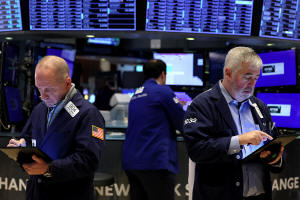Marketmind: Stocks stall after VIX hits pre-COVID low
 Send a link to a friend
Send a link to a friend
 [November 27, 2023] A
look at the day ahead in U.S. and global markets from Mike Dolan [November 27, 2023] A
look at the day ahead in U.S. and global markets from Mike Dolan
Global markets took a sharp intake of breath on Monday after seeing Wall
St's 'fear gauge' hit its lowest since before the pandemic hit late last
week and as China major stock indexes continue to wane.
As U.S. markets return in earnest from the long Thanksgiving weekend,
Friday's shortened session threw up a remarkable milestone.
The VIX index of implied volatility on the S&P500 plunged to its lowest
close since just before the COVID-19 shock unfolded in 2020 - an extreme
some fear will inspire demand for options hedging and reversion back
toward historic mean. It ticked back up to regain a foothold above 13
today.
But while the quirky Friday move may have been partly related to the
holiday and a 30-day contract horizon falling around Christmas,
evaporation of 'vol' is reflected elsewhere and reveals a bullish tilt
into 2024 amid hopes that record flows to cash will reverse and buoy
both stocks and bonds.
Even with another $148 billion of new 2-, 5- and 7-year U.S. Treasury
notes up for auction on Monday and Tuesday, equivalent bond market
volatility measures also dropped to their lowest since September 25.

With Federal Reserve officials still holding the line that it's way to
early to talk about interest rate cuts, Treasury yields have crept back
up a notch - in part awaiting this week's PCE inflation report for
October and a speech on Friday from Fed chief Jerome Powell. New home
sales data is on Monday's slate.
Ten-year Treasury yields hovered just under 4.50% first thing, about 10
basis points up from Wednesday's intraday low.
Fed futures have pulled back to now price just 80bps of rate cuts by the
end of next year - even though some banks still expect far more.
Deutsche Bank on Monday said it expected a whopping 175bp of Fed rate
cuts in 2024 as a mild recession there hits - leaving the policy rate at
just 3.63% at yearend.
Monday's stock opening looked to be in the red, however, with Asia and
European bourses falling back. Early indications of retail around 'Black
Friday' sales were upbeat, heaviest online and amid significant
discounting.
The dollar index was lower despite last weeks backup in yields, with
U.S. crude oil prices on the slide again ahead of OPEC+'s re-scheduled
meeting on Thursday. The final day of an agreed four-day pause in the
fighting in Gaza got underway amid hopes for further hostage releases.
As still-positive U.S. economic surprises indexes ebb and deeply
negative euro zone equivalents improve somewhat, the surprise gap
between the two blocs has fallen to its lowest since May.

[to top of second column] |

Traders work on the floor at the New York Stock Exchange (NYSE) in
New York City, U.S., November 17, 2023. REUTERS/Brendan McDermid/File
Photo

But nervousness about China's economy and the alarming
underperformance of Chinese stock benchmarks - now running at 21%
year-to-date against MSCI's all-country indexes - continued to jar.
Profit growth at China's industrial firms slowed again last month,
with year-on-year gains of just 2.7% missing forecasts and
suggesting more policy support measures are needed to help shore the
world's second-largest economy.
Property developers plunged 2.3%, failing to sustain recent gains on
hopes of government support.
Beijing police, meantime, are investigating suspected crimes
committed by Zhongzhi Enterprise Group, a leading Chinese wealth
manager, according to a social media post published by the Chaoyang
Public Security Bureau on Saturday.
And there was also some alarm at health developments and rising
respiratory illnesses, despite official assurances. A spike such
illnesses is due to peak in the coming weeks but is not as high as
before the COVID-19 pandemic, a World Health Organisation official
said - reiterating that no new or unusual pathogens had been found
in the recent cases.
But not all was in the red, even if for worrying reasons. Small cap
Chinese stocks rose after the Beijing Stock Exchange de facto
implemented a new policy that prevents major shareholders of
companies listed on its bourse from selling stock, three sources
told Reuters.
Shares of Beijing Stock Exchange jumped 11% following a record 21%
gain last week.

Key developments that should provide more direction to U.S. markets
later on Monday:
* U.S. Oct new home sales, Dallas Fed Nov manufacturing survey
* U.S. Treasury sells 2- and 5-year notes, 3- and 6-month bills
* European Central Bank chief Christine Lagarde speaks in European
Parliament
* U.S. corporate earnings: Zscaler, Cerence, Anavex Life Sciences,
UP Fintech, Ituran Location and Control, Smart Share Global
(By Mike Dolan, Editing by Bernadette Baummike.dolan@thomsonreuters.com.
Twitter: @reutersMikeD)
[© 2023 Thomson Reuters. All rights
reserved.]
This material may not be published,
broadcast, rewritten or redistributed.
Thompson Reuters is solely responsible for this content. |